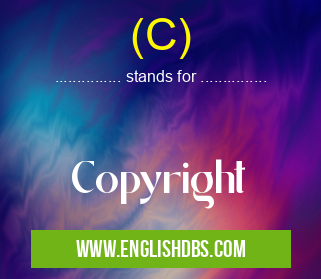What does (C) mean in LAW & LEGAL
The term (C), generally seen within parentheses, is often used to signify an abbreviation or a copyright claim. The acronym (C) stands for Copyright and it indicates that the user holds the exclusive right to reproduce, adapt or distribute the content in question. A copyright owner is entitled to certain economic rights which exist to protect the ‘author’s intellectual property’ from unauthorized use by others.

(C) meaning in Law & Legal in Governmental
(C) mostly used in an acronym Law & Legal in Category Governmental that means Copyright
Shorthand: (C),
Full Form: Copyright
For more information of "Copyright", see the section below.
Meaning in Governmental Context
In governmental contexts, claiming a copyright on a certain document can be helpful during legal disputes regarding ownership of the content. This symbol shows that the government has complete authority over the reproduction, distribution or adaptation of any material reproduced under their name and underneath this symbol.
Full Form
The full form of (C) written within parentheses simply means Copyright and it works as an acknowledgement to show that all details contained in whatever documents are copyrighted and covered by law as being owned by an individual or company. It also serves as a warning sign for anyone trying to replicate these details without permission from the rightful owner.
What Does (C) Stand For?
(C) stands for Copyright as stated above and its primary purpose is to provide legal protection for intangible assets such as musical recordings, movies, books, essays and other types of creative works which have tangible value but are not physical objects. This symbol informs others that they do not have authorization to use these materials without prior consent from the original author or creator. Furthermore, it also protects any artistic endeavors from being passed off as someone else's work and helps prevent plagiarism on any level.
Essential Questions and Answers on Copyright in "GOVERNMENTAL»LAW"
What is copyright?
Copyright is a form of intellectual property protection that grants creators exclusive rights over their work. When a work is copyrighted, only the creator can make copies of it, distribute it, display it in public, or create derivative works based on the original.
Who owns the copyright to a work?
Generally speaking, the author of a work owns the copyright to that work. If multiple individuals created the work together, then they would typically own copyright jointly unless they agree otherwise.
How long does copyright last?
Copyright lasts for the lifetime of the author plus an additional 70 years. After this period expires, the work enters into public domain and can be used by anyone without permission from its creator.
Do I need to register my copyright?
Yes, registering your copyright with a government office such as the U.S. Copyright Office provides legal protection should you ever need to take legal action against someone who has infringed upon your rights as an author or creator.
Does my country recognize international copyrights?
Most countries have signed onto international agreements that recognize foreign copyrights as valid within their own borders, so long as certain requirements are met. It's best to check with your local intellectual property office for more information on specific requirements and procedures for registering foreign copyrights in your country.
How can I protect my copyrighted material from being copied without permission?
The best way to protect your copyrighted material is through watermarking it or encrypting files that contain sensitive information before distributing them online. Additionally, you can also use software programs like DRM (Digital Rights Management) and encryption technologies to prevent unauthorised access and copying of your material online.
Does fair use apply to copyrighted works?
Yes, although fair use laws vary depending on where you live, they typically allow people to reproduce limited portions of copyrighted works under certain circumstances without needing explicit permission from the author (e.g., educational purposes).
Can I license my copyrighted work?
Yes, you can choose to license out your copyrighted work instead of selling it outright if you want another entity or individual to be able to use it for commercial purposes while giving yourself some control over how it’s used and distributed.
Final Words:
In conclusion, (C) written within parentheses signifies Copyright and this symbol allows individuals and companies alike to secure their work under certain laws established in order to protect their intellectual property against misconduct or infringement. By displaying this symbol either digitally or physically alongside your work you can ensure that your efforts will remain rightfully yours while giving notice of your ownership status to anyone else who attempts to use said items without authorization.
